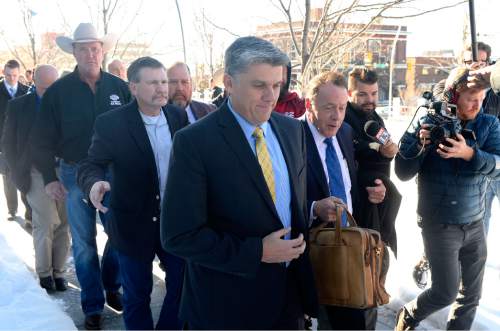This is an archived article that was published on sltrib.com in 2015, and information in the article may be outdated. It is provided only for personal research purposes and may not be reprinted.
On top of the expense and the shame of being dragged through a federal criminal trial and a restitution bill of nearly six figures, the jail sentence of 10 days — plus three years of probation — seems proper for San Juan County Commissioner Phil Lyman.
Even Tim DeChristopher thinks so.
Lyman received the minimal sentence Friday from U.S. District Judge David Nuffer. It was the end of a case that began in spring 2014 when Lyman and co-defendant Monte Wells were the organizers and promoters of a protest ride of ATVs into Recapture Canyon near Blanding.
DeChristopher was sentenced to two years in federal prison back in 2011 for his protest of how the federal government treats the land it owns in Utah. His crime was to bid on oil leases put up for auction by the same Bureau of Land Management that had closed Recapture Canyon to motorized vehicles in order to protect American Indian artifacts.
The injustice is apparent.
DeChristopher sought to save fragile lands that belong, by right and by law, to the American people, now and forever. His action was spontaneous and motivated by a reasonable fear that the leases — rushed to auction by the outgoing Bush administration and later withdrawn by the Obama Interior Department — placed private profit ahead of public good.
Lyman was agitating for the right of a few people who care about neither land nor law to play with their noisy toys on someone else's property. His protest was long-planned, and the BLM had warned that it could lead to prosecution.
But, legally, DeChristopher committed a felony while Lyman was guilty only of a misdemeanor. So the sentence DeChristopher received from Judge Dee Benson was within the law — though, compared with the more reasonable penalty Lyman received, it was far outside the bounds of justice.
DeChristopher tweeted a magnanimous reaction to Lyman's sentencing. He said the jail time was fair, but the ruling that Lyman not advocate for his positions while on probation was "unconstitutional, inapproprate and unjust."
It still grates that Benson wouldn't allow DeChristopher to raise a necessity defense or give him credit for good intentions, while Nuffer fretted that throwing the book at Lyman would only enrage people whose position on public lands is already filled with anger and the brandishing of firearms.
But Nuffer also helped to blunt any sympathy Lyman might gain as a martyr for a bad cause.
In the long run, true justice would be served if DeChristopher's Peaceful Uprising campaign grows in prominence and strength, while Lyman's crusade simply fades away.



